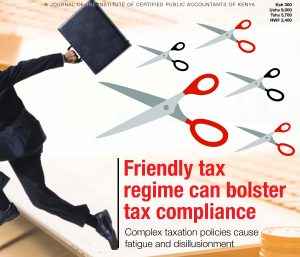Complex taxation policies cause fatigue and disillusionment
In this world, nothing can be said to be certain, except death and taxes” – Benjamin Franklin,1798
Payment of taxes is as old as before Jesus Christ who also encouraged his followers to give Caesar what
belongs to Caesar. It is a mode of revenue collection by a national or regional government. This revenue stream is applied the world over. Even the richest countries in the world levy taxes to its citizens.
A few countries like the United Arabs Emirates, the Bahamas and Monaco among others do not levy income tax to its citizens. Nonetheless, the citizens are indirectly taxed through other mechanisms to fund overnment programmes. This is in appreciation that the government needs taxes to run the state; pay for security, develop infrastructure, offer social services, pay public servants who provide some of these services, and service loans which have been acquired from commercial institutions and bilateral lenders to bridge budgetary gaps.
 Every citizen who uses or expects to use good roads, expects or is provided with security services and access to all other government facilities and services is obliged and must appreciate that these
Every citizen who uses or expects to use good roads, expects or is provided with security services and access to all other government facilities and services is obliged and must appreciate that these
services come at a cost. The cost we pay for these services, some, apparently ‘free’ is the tax that we pay to the government.
For purposes of equality of service By James Fredrick Ochieng COVER STORY ‘In this world, nothing can be said to be certain, except death and taxes” – Benjamin Franklin,1798 THE ACCOUNTANT THE ACCOUNTANT JANUARY- FEBRUARY 2020 13 delivery, some citizens may not directly enjoy the services due to their environment; for example their children attend private schools and their families are treated at
private hospitals. We all have a responsibility then to ensure those not privileged to enjoy this service are taken care of. That is the purpose of a functioning state; where certain services must be available at the
bare minimum with those willing to pay a premium for superior services being at liberty to do so.
Payment of taxes does not guarantee the equivalent value of services. However, every taxpayer is expected to pay his fair share of taxes whether or not the government offers equivalent services. The nature of government is that service delivery will be prioritized depending on the government in power, its manifesto,
development blueprints, promises made to the citizenry and strategies of the party in power. While citizens have an obligation to pay their taxes, the government equally has a responsibility to ensure that the taxes are applied in an equitable, efficient, and costeffective manner. There should be value for money in the application of tax revenue.
The government also has an obligation to ensure that the system of taxation and tax policies ensure equity, simplicity, fairness, effectiveness, and clarity and is administratively easy to implement both by the government and the taxpayer. Of note is the need to make it as easy as possible for the taxpayer to meet his tax obligations effortlessly and at the lowest cost possible.
This encourages tax evasion due to laziness, ignorance or blatant breach of the law by the tax payers who find it cumbersome to file the necessary returns and besides they don’t see the benefit of their effort
in the general wellbeing of the populace.
While citizens have an obligation to pay their taxes, the government equally has a responsibility to ensure that the taxes are applied in an equitable, efficient, and cost effective manner. There should be value for money in the application of tax revenue.
Whenever there is a revenue shortfall, the government will go all out raiding and arresting non-compliant tax payers. This act complicates tax administration by denying government revenue even as the issues are
resolved in a court of law where they drag for years. A lot of resources are wasted during the tax investigations and through the court process.
The strong arm tactics applied by the government can sometimes be counterproductive leading to collapse
of businesses who suffer when agency notices are placed on their bank accounts by the Revenue Authority or where their equipment and products are seized and detained. When a business collapses as a
result, the government might be able to recover the intended revenue if any but only for that moment. Subsequent revenue streams are completely dried up when the businesses cease operations. This affects
the long term revenue projections of the government and has a ripple effect due to job loses, loss of rental income, loss of revenue to the local county government, loss of market for suppliers to the business
among others.
This predicament is unfortunately affecting some existing tax payers who have over time shouldered the burden of paying taxes and have always suffered tax increments like the beverage and cigarette
industry more often through the ‘friendlier’ sin tax adage. More players in the informal sector like the ‘boda boda’ riders and the matatu industry should be brought into the tax bracket to help shoulder the burden of
taxation.
This suggests that the government is obliged to change its approach to tax administration by encouraging selfdeclaration and self-assessment. This can be achieved by having a taxpayer responsive service charter, projecting a tax payer friendly institution as opposed to a policing and menacing tax administrator. Even
where a tax payer is in breach of the law, a fair but firm approach should be applied in having the tax payer pay his fair share without affecting the usual operations of the business. This can be achieved by
working on a payment plan as opposed to seizing the taxpayer’s assets.
Most importantly, the public needs to see a deliberate effort of efficient utilization of tax revenues to priority areas directly affecting their welfare for instance in health care, education, clean water, agriculture and roads among others. This will encourage taxpayers to meet their obligations even as the economy grows leading to broader tax bases.
It is worth noting that taxation has been part of humanity from time immemorial. The ancient world offered a per centum of their harvest (income) or the best of their animals for sacrifice to gods. Part of this
sacrifice was offered as burnt offering while some were used to support the priests who were taking spiritual care of the community and were not able to do their own farming. The modern church still practices this tradition through tithing, the resources of which are used to do mission work and
support church administrative activities among other services.
CPA James Fredrick Ochieng is a member of ICPAK.



